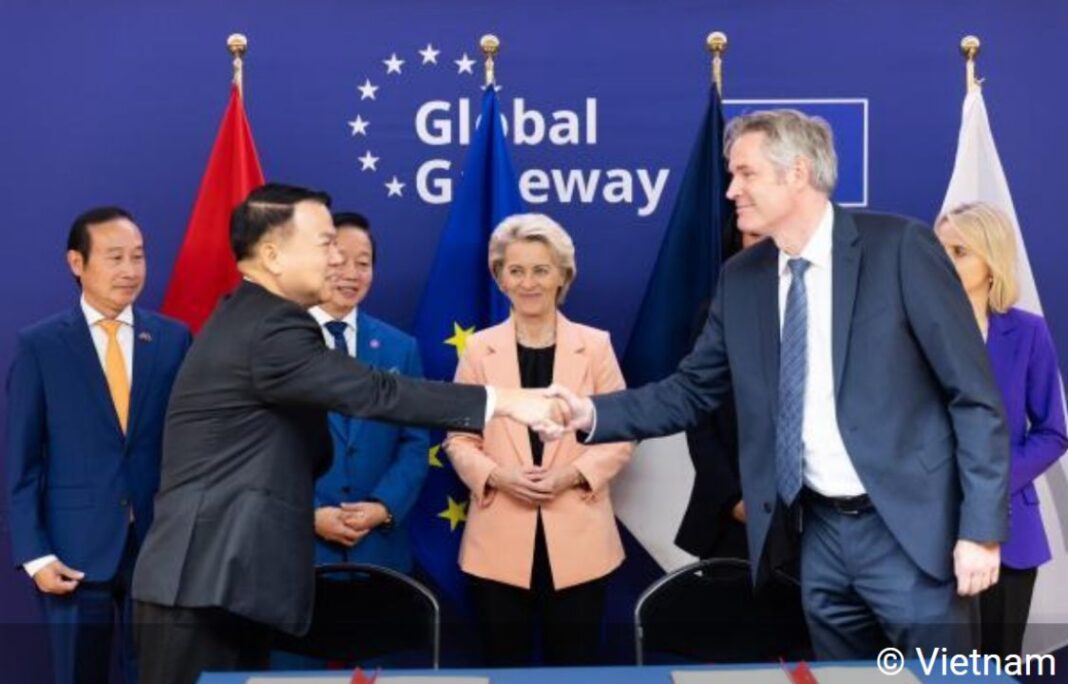The European Investment Bank (EIB) and Vietnam have signed a memorandum of understanding (MoU), pledging €500M to accelerate Vietnam’s Just Energy Transition Partnership (JETP) for societal and environmental gains.
Ursula von der Leyen, President of the European Commission says, “Today, we are taking an important step to support Vietnam’s ambitious net zero goal for 2050.”
“The European Commission, the EIB and Vietnam are partnering to support the renewable energy transition and energy security. With this €500M of funding, Global Gateway is making a difference for the people of Vietnam.”
EIB Global is a branch of the EIB Group focused on enhancing international partnerships and development finance outside the EU. It aims to strengthen collaborations within Team Europe and the EU Global Gateway strategy, working alongside other development finance institutions and civil society.
Through its global offices, EIB Global aims to connect with local communities, businesses, and institutions worldwide.
Aim of the memorandum
The MoU was signed During the Global Gateway Forum in Brussels. The signing ceremony was attended by EIB Vice-President Teresa Czerwińska, European Commission President Ursula von der Leyen, and Vietnamese Deputy Prime Minister Tran Hong Ha.
This €500M multi-project credit facility highlights EIB and Vietnam’s mutual commitment to establish the facility, enabling funding for projects under a framework loan.
EIB’s VP Teresa Czerwińska says, “The EIB’s €500M commitment goes beyond finance, driving a transition to sustainable energy and a resilient economy in Vietnam. Through initiatives like Global Gateway we, together with the European Commission, are turning global challenges into opportunities for sustainable development and innovation.”
Global Gateway making a difference for Vietnam
The European Union, via Global Gateway, aims to help Vietnam accomplish a fair energy transition and meet its climate objectives.
The initiative focuses on the Just Energy Transition Partnership (JETP) and emphasises green economy, circular economy, sustainability, education, and skills development. Specific projects will cover areas such as forest value chains, skills training, and technical education, among others.
What is Global Gateway?
The Global Gateway strategy, led by the European Union, seeks to bridge the global investment gap by promoting smart, clean, and secure connections in key sectors.
Ursula von der Leyen says, “We will support smart investments in quality infrastructure, respecting the highest social and environmental standards, in line with the EU’s values and standards. The Global Gateway strategy is a template for how Europe can build more resilient connections with the world.”
Through a ‘Team Europe approach‘, it aims to mobilise up to €300B in investments between 2021 and 2027, focusing on essential connections and closing global investment disparities.
Team Europe comprises the European Union, EU Member States, public development banks, the European Investment Bank (EIB), and the European Bank for Reconstruction and Development (EBRD).
Initially formed for a unified response to COVID-19, it now underpins Global Europe, the primary financial tool for EU international cooperation and its programming. This approach includes Team Europe Initiatives, serving as its flagship projects.
Brief about The Global Gateway Forum
The Global Gateway Forum convenes EU and global government representatives, private sector leaders, and organisations to promote global investments in transformative infrastructure, aligning with UN Sustainable Development Goals.
The Forum focuses on key themes including green energy transition, education, critical raw materials, transport, health products, and digital infrastructure. It showcases the G7 Partnership for Global Infrastructure and Investment’s progress.
The inaugural Global Gateway Forum occurred in Brussels on October 25-26, 2023, bringing together over 40 government officials, financial institutions, and businesses.
Discussions were centered around global investment needs, solutions, and initiatives, leading to the establishment of partnerships in areas like green energy, critical raw materials, connectivity, health, and education.






